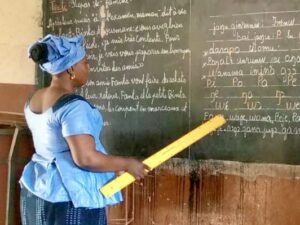In the Mopti region, where Eyes of the world carries out its cooperation programme, there are only three ophthalmologists in practice to attend to more than two million inhabitants. In addition, the area is experiencing a difficult political-war situation that is causing a massive exodus of people fleeing the most conflictive regions, causing a shortage of resources of all kinds, including health resources.
This is why it is so important to reinforce the first level of eye care, that of community health workers (CHWs) who carry out home visits and thus provide care to the most vulnerable population, especially women and girls because they have less autonomy and more complications in moving around.

One of the Foundation’s latest projects has been to offer these health workers training courses in local languages to enable them to communicate and better serve the population. In October, 50 community health workers completed five months of training in the centres of Sofara, Mougna, Djenné, Sangha, Kendié and Bandiagara to understand local languages such as Dogon, Bambara and Peul. In this way, they can better contact the population to diagnose their eye pathologies and treat or refer them correctly.
With the same objective of optimising the eye care service, the CHWs are also present at the monthly coordination meetings with the Bandariaga and Djenné reference health centres. At these meetings, the community agents share with the medical assistants in ophthalmology (MAO) the day-to-day running of their practices in order to make the needs of the population known. It is also a time for coordinating and scheduling visits because, being in remote rural settings, the logistics of collecting data and information are very complicated.
This Eyes of Mali project is supported by the Government of Navarre.